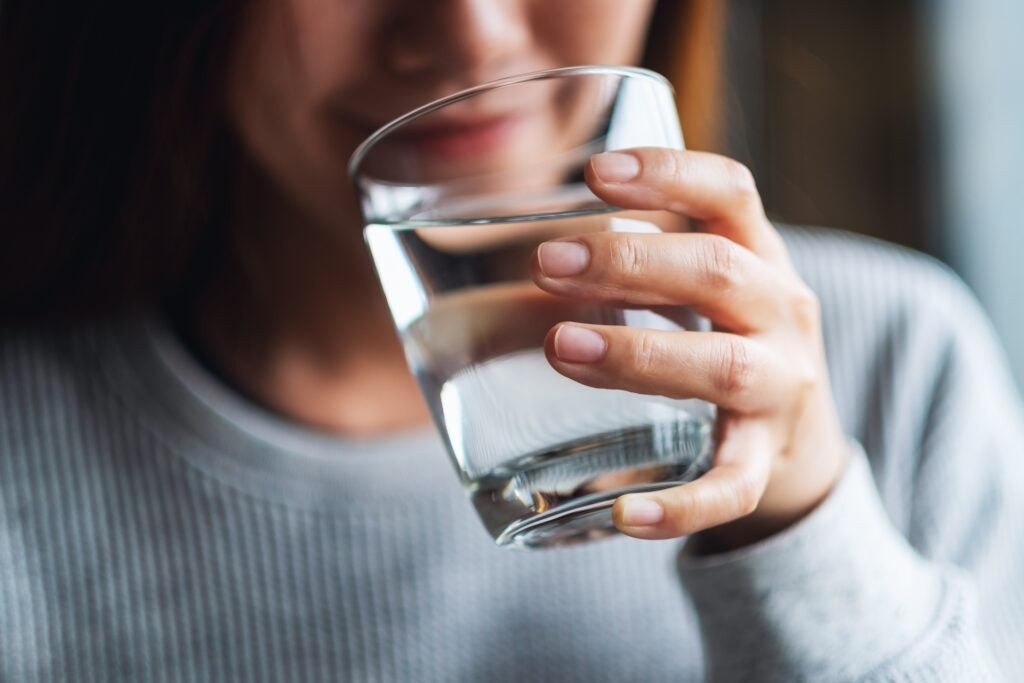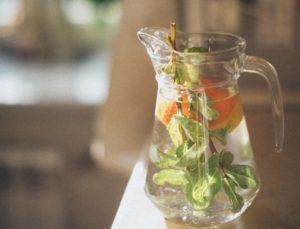Are you unsure about how much water you should be drinking daily? At HOW.EDU.VN, we provide expert guidance on optimal hydration for your health. This article will delve into the factors influencing your daily water needs, offering practical tips and debunking common myths. Discover the ideal water intake for your body with advice from top experts.
1. Understanding Your Daily Water Needs: A Comprehensive Guide
The amount of water you should drink daily is not a one-size-fits-all answer. It depends on various factors like your age, activity level, climate, and overall health. While the “8 glasses a day” rule is commonly cited, individual needs can vary significantly. Let’s explore the science-backed recommendations and personalized approaches to help you stay adequately hydrated.
1.1. General Recommendations for Daily Water Intake
According to the National Academy of Medicine, an adequate daily fluid intake is approximately 13 cups (104 ounces) for men and 9 cups (72 ounces) for women. However, these are just guidelines. Your specific needs may be higher if you are physically active or live in a warm climate. Conversely, those with smaller body sizes may require less.
| Age Group | Daily Adequate Intake |
|---|---|
| 1-3 years | 4 cups (32 ounces) |
| 4-8 years | 5 cups (40 ounces) |
| 9-13 years | 7-8 cups (56-64 ounces) |
| 14-18 years | 8-11 cups (64-88 ounces) |
| Men (19+ years) | 13 cups (104 ounces) |
| Women (19+ years) | 9 cups (72 ounces) |
| Pregnant Women | 10 cups (80 ounces) |
| Breastfeeding Women | 13 cups (104 ounces) |


It’s important to remember that these recommendations include fluids from all sources, including water, beverages, and food. Fruits and vegetables, for instance, have high water content and contribute to your daily fluid intake.
1.2. Factors Influencing Your Water Intake Needs
Several factors influence how much water you should drink daily. Understanding these can help you tailor your hydration strategy to meet your body’s specific requirements.
- Activity Level: Physical activity increases water loss through sweat. Athletes and individuals who exercise regularly need to drink more water to replenish lost fluids. Research indicates that athletes engaging in prolonged, strenuous exercise should increase their water intake by 1.5 to 2.5 cups per hour of activity, according to a study published in the “Journal of Athletic Training.”
- Climate: Hot and humid weather leads to increased sweating, which requires higher fluid intake. People living in tropical or arid climates need to be particularly mindful of their hydration levels. Studies from the Environmental Protection Agency (EPA) highlight the importance of increased water consumption during heatwaves to prevent heatstroke and dehydration.
- Health Conditions: Certain medical conditions, such as diabetes and kidney disease, can affect fluid balance. Individuals with these conditions should consult their healthcare provider to determine their optimal water intake. The National Institute of Diabetes and Digestive and Kidney Diseases (NIDDK) provides detailed guidelines for managing fluid intake for various health conditions.
- Pregnancy and Breastfeeding: Pregnant and breastfeeding women have higher fluid needs to support both their own health and the development of the baby. The American College of Obstetricians and Gynecologists (ACOG) recommends pregnant women drink 8-12 cups of water daily and breastfeeding women aim for at least 13 cups.
- Age: As we age, our sense of thirst can diminish, making older adults more vulnerable to dehydration. Older adults should proactively monitor their fluid intake, even if they don’t feel thirsty. A study in the “Journal of Gerontology” found that older adults who consciously increased their water intake experienced improved cognitive function and overall health.
- Diet: A diet high in sodium can increase fluid loss, while a diet rich in fruits and vegetables can contribute to hydration. Adjust your water intake based on your dietary habits. According to the Dietary Guidelines for Americans, a balanced diet with plenty of fruits and vegetables can significantly contribute to your daily hydration needs.
1.3. The Role of Electrolytes in Hydration
When you sweat, you lose not only water but also electrolytes like sodium, potassium, and magnesium. These electrolytes are crucial for maintaining fluid balance, muscle function, and nerve signaling. In cases of heavy sweating, such as during intense exercise or in hot weather, replenishing electrolytes is essential for optimal hydration.
Sports drinks can help replace electrolytes, but they often contain added sugars and artificial ingredients. A healthier alternative is to consume electrolyte-rich foods like bananas (potassium), spinach (magnesium), and pickles (sodium). Homemade electrolyte drinks, using ingredients like coconut water, lemon juice, and a pinch of salt, are also a great option.
1.4. Debunking the Alkaline Water Myth
Alkaline water has gained popularity in recent years, with claims ranging from weight loss to cancer prevention. The theory behind alkaline water is that it can neutralize acid in the body, leading to improved health. However, scientific evidence does not fully support these claims.
Alkaline water typically has a pH level of 8-9, compared to tap water’s pH of around 7. While some studies suggest that alkaline water may have temporary benefits, such as reducing acid reflux symptoms, the body’s natural regulatory mechanisms tightly control blood pH levels. Drinking alkaline water is unlikely to have a significant or lasting impact on overall health.
According to a Mayo Clinic report, the human body maintains a remarkably stable pH level in the blood, typically around 7.35 to 7.45. This narrow range is crucial for various bodily functions, and the body has multiple mechanisms, including the respiratory and renal systems, to keep it within this range. Consuming alkaline water is unlikely to significantly alter this balance.
Bottom Line: If you enjoy drinking alkaline water and it encourages you to stay hydrated, that’s perfectly fine. However, plain regular water is equally effective for hydration and provides similar health benefits.
2. Recognizing and Preventing Dehydration: Listen to Your Body
Dehydration occurs when your body loses more fluids than it takes in, disrupting normal bodily functions. Recognizing the signs of dehydration and taking proactive steps to prevent it are crucial for maintaining optimal health and well-being.
2.1. The Role of Thirst: Is It Enough?
Thirst is the body’s primary signal that it needs more fluids. However, relying solely on thirst may not be sufficient, especially for certain populations.
As we age, our sense of thirst tends to diminish, making older adults more susceptible to dehydration. Conditions like dementia or stroke can also impair thirst perception. Athletes, people who are ill, and infants may also not have an adequate sense of thirst to meet their fluid needs.
Research from the Cochrane Library suggests that commonly used indicators of dehydration in older adults, such as urine color and thirst sensation, are not always reliable. Therefore, proactive hydration strategies are essential for these groups.
2.2. Symptoms of Dehydration: What to Watch For
Even mild dehydration can produce a range of symptoms. Recognizing these early signs can help you take corrective action before dehydration becomes severe.
Common symptoms of dehydration include:
- Fatigue
- Headache
- Dizziness
- Dry mouth and throat
- Dark urine
- Decreased urine output
- Confusion or short-term memory loss
- Mood changes like increased irritability or depression
If you experience these symptoms, it’s essential to drink water or electrolyte-rich fluids to rehydrate your body.
2.3. Risks of Dehydration: Long-Term Health Implications
Chronic dehydration can increase the risk of several medical conditions. Staying adequately hydrated is essential for preventing these complications.
Potential risks of dehydration include:
- Urinary tract infections
- Kidney stones
- Gallstones
- Constipation
- Cognitive impairment
- Increased risk of falls (especially in older adults)
- Heatstroke (in hot weather)
2.4. Proactive Hydration Strategies: Staying Ahead of Thirst
To prevent dehydration, adopt a proactive approach to hydration. Here are some practical strategies:
- Carry a water bottle with you and sip throughout the day.
- Set reminders on your phone to drink water regularly.
- Drink a glass of water with each meal and snack.
- Consume water-rich foods like fruits and vegetables.
- Monitor your urine color – pale yellow indicates good hydration, while dark yellow suggests dehydration.
- Increase your fluid intake during and after physical activity.
- Be mindful of environmental factors, such as hot weather, and adjust your water intake accordingly.
3. Overhydration: Can You Drink Too Much Water?
While dehydration is a common concern, it’s also possible to drink too much water, leading to a condition called hyponatremia. Although rare, hyponatremia can be dangerous and requires prompt medical attention.
3.1. Understanding Hyponatremia: Water Toxicity
Hyponatremia occurs when the sodium levels in your blood become too diluted due to excessive water intake. Sodium is an essential electrolyte that helps regulate fluid balance, nerve function, and muscle contractions. When sodium levels drop too low, it can lead to a range of symptoms, from mild to severe.
Symptoms of hyponatremia can include:
- Nausea
- Headache
- Confusion
- Muscle weakness, spasms, or cramps
- Seizures
- Loss of consciousness
In severe cases, hyponatremia can lead to brain swelling, coma, and even death.
3.2. Who is Most at Risk for Hyponatremia?
Hyponatremia is more likely to occur in certain populations:
- Athletes: Endurance athletes, such as marathon runners and triathletes, are at risk of hyponatremia due to prolonged exercise and excessive water consumption without adequate electrolyte replacement.
- Individuals with Kidney Problems: People with kidney disorders may have difficulty excreting excess water, increasing their risk of hyponatremia.
- People with Certain Medical Conditions: Conditions like heart failure, liver disease, and syndrome of inappropriate antidiuretic hormone secretion (SIADH) can impair the body’s ability to regulate fluid balance.
- Infants: Infants are more vulnerable to hyponatremia due to their small body size and immature kidney function.
3.3. Preventing Overhydration: Finding the Right Balance
To prevent overhydration and hyponatremia, follow these guidelines:
- Listen to Your Body: Drink when you’re thirsty, but don’t force yourself to drink excessive amounts of water.
- Replace Electrolytes: If you’re engaging in prolonged, strenuous exercise, consume sports drinks or electrolyte-rich foods to replenish lost sodium and other electrolytes.
- Avoid Overdrinking Before Exercise: Don’t drink large amounts of water immediately before exercise, as this can increase your risk of hyponatremia.
- Monitor Urine Color: Pale yellow urine indicates good hydration, while clear urine may suggest overhydration.
- Consult Your Doctor: If you have kidney problems or other medical conditions that affect fluid balance, talk to your doctor about your optimal water intake.
4. Practical Tips for Healthy Hydration: Making Water More Appealing
For some people, plain water can seem boring. Here are some creative ways to make hydration more appealing and enjoyable:
4.1. Infused Water: Adding Flavor Naturally
Infused water is a delicious and refreshing way to add flavor to your water without added sugars or artificial ingredients. Simply add sliced fruits, vegetables, or herbs to a pitcher of water and let it infuse for a few hours in the refrigerator.
Popular infusion combinations include:
- Lemon and cucumber
- Strawberry and basil
- Orange and ginger
- Mint and lime
- Pineapple and cilantro
Experiment with different combinations to find your favorites!
4.2. Sparkling Water with a Splash of Juice: A Healthier Alternative to Soda
If you crave the fizz of soda, try sparkling water with a splash of juice. This provides a refreshing, flavorful drink with fewer calories and less sugar than traditional soda.
Choose 100% fruit juice and add just a small amount to your sparkling water for flavor. You can also add sliced citrus fruits or fresh herbs for an extra boost of flavor.
4.3. Herbal Teas: Warm and Hydrating
Herbal teas are a great way to stay hydrated, especially during colder months. Many herbal teas have additional health benefits, such as chamomile for relaxation or ginger for digestion.
Choose caffeine-free herbal teas to avoid any diuretic effects. Popular options include:
- Chamomile tea
- Peppermint tea
- Ginger tea
- Hibiscus tea
- Rooibos tea
4.4. Water-Rich Foods: Eating Your Way to Hydration
Many fruits and vegetables have high water content and can contribute significantly to your daily fluid intake.
Examples of water-rich foods include:
- Watermelon
- Cucumber
- Strawberries
- Spinach
- Celery
- Lettuce
Include these foods in your diet to boost your hydration levels naturally.
4.5. Ditch Single-Use Plastic Water Bottles: A Sustainable Choice
Consider purchasing a reusable water bottle instead of relying on single-use plastic bottles. This is not only better for the environment but also more convenient and cost-effective in the long run.
Choose a durable, BPA-free water bottle that you can easily carry with you throughout the day.
4.6. Are Seltzers and Other Fizzy Waters Safe and Healthy to Drink?
Seltzers and other fizzy waters are generally safe and healthy to drink. The carbonation process, which involves dissolving carbon dioxide gas in water under pressure, lowers the pH of the water, making it slightly more acidic. However, research has not shown that carbonated beverages are associated with dental decay unless they also contain sugar or other sweeteners.
5. The Expertise of HOW.EDU.VN: Your Path to Optimal Hydration
Navigating the complexities of hydration can be challenging, especially with the abundance of conflicting information available. At HOW.EDU.VN, we understand the difficulties you face in finding reliable guidance tailored to your unique needs. Our team of over 100 Ph.D.-level experts worldwide is dedicated to providing you with the accurate, personalized advice you deserve.
5.1. Connecting with Experts: Personalized Hydration Plans
Imagine having direct access to leading Ph.D.s who can craft a hydration plan tailored to your lifestyle, health conditions, and goals. At HOW.EDU.VN, we make this a reality. Our experts take the time to understand your specific needs and challenges, offering comprehensive support to help you achieve optimal hydration.
5.2. Benefits of Expert Consultation: Why Choose HOW.EDU.VN?
Choosing HOW.EDU.VN means gaining access to:
- Personalized Strategies: Receive tailored hydration plans that consider your activity level, climate, health conditions, and dietary habits.
- Evidence-Based Guidance: Our experts provide advice based on the latest scientific research, ensuring you receive accurate and reliable information.
- Comprehensive Support: Get answers to all your hydration-related questions and concerns, with ongoing support from our team of experts.
- Time and Cost Savings: Avoid the confusion and expense of sifting through generic advice. Our experts provide efficient, effective solutions tailored to your needs.
- Confidentiality and Trust: Your privacy is our priority. We ensure that all consultations are confidential and conducted with the utmost professionalism.
- Practical Solutions: Receive actionable tips and strategies you can implement immediately to improve your hydration habits and overall well-being.
5.3. Success Stories: Real Results with HOW.EDU.VN
Many clients have experienced significant improvements in their hydration habits and overall health with the guidance of our experts. For instance, a marathon runner struggling with dehydration during races consulted with one of our sports nutrition Ph.D.s. The expert developed a customized hydration plan that included electrolyte supplementation, resulting in improved performance and reduced symptoms of dehydration.
Another client with kidney stones consulted with one of our nephrology Ph.D.s. The expert provided tailored advice on fluid intake and dietary modifications, which helped reduce the frequency of kidney stone formation.
5.4. Take the Next Step: Connect with Our Experts Today
Don’t let confusion or misinformation keep you from achieving optimal hydration. Connect with the HOW.EDU.VN team of Ph.D.-level experts today and experience the benefits of personalized, evidence-based guidance.
- Address: 456 Expertise Plaza, Consult City, CA 90210, United States
- WhatsApp: +1 (310) 555-1212
- Website: HOW.EDU.VN
Contact us today to start your journey toward optimal hydration and overall well-being. Let our experts at how.edu.vn guide you toward a healthier, more hydrated life.
FAQ: Your Questions About Hydration Answered
1. How much water should I drink if I exercise regularly?
If you exercise regularly, increase your water intake by 1.5 to 2.5 cups per hour of activity. Also, consider consuming electrolyte-rich foods or sports drinks to replace lost electrolytes.
2. What are the best sources of electrolytes?
Electrolyte-rich foods include bananas (potassium), spinach (magnesium), and pickles (sodium). Homemade electrolyte drinks, using ingredients like coconut water, lemon juice, and a pinch of salt, are also a great option.
3. Is it better to drink water all at once or throughout the day?
It’s generally better to drink water throughout the day to maintain consistent hydration levels. Sipping water regularly is more effective than drinking large amounts all at once.
4. Can I count other beverages, like tea or juice, towards my daily water intake?
Yes, other beverages can contribute to your daily water intake. However, be mindful of added sugars and caffeine content, as these can have other health effects. Herbal teas, for example, are a great way to stay hydrated without added sugars or caffeine.
5. What are the signs of mild dehydration?
Symptoms of mild dehydration include fatigue, headache, dizziness, dry mouth and throat, and dark urine.
6. How can I make water taste better?
Try infusing water with sliced fruits, vegetables, or herbs. Popular combinations include lemon and cucumber, strawberry and basil, and orange and ginger.
7. Is it possible to drink too much water?
Yes, it’s possible to drink too much water, leading to a condition called hyponatremia. However, this is rare and more likely to occur in athletes or individuals with certain medical conditions.
8. How can I prevent overhydration?
To prevent overhydration, drink when you’re thirsty, but don’t force yourself to drink excessive amounts of water. Also, replace electrolytes if you’re engaging in prolonged, strenuous exercise.
9. Should I drink more water in the summer?
Yes, you should increase your water intake in the summer due to increased sweating and the risk of dehydration.
10. What if I have a medical condition that affects fluid balance?
If you have a medical condition that affects fluid balance, consult your healthcare provider to determine your optimal water intake.
